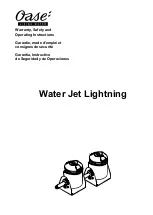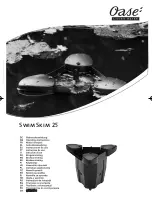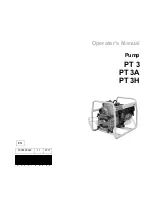
5. Use caution when cleaning and changing nozzle tips.
In the case where the nozzle tip clogs while spraying,
ALWAYS lock gun trigger, shut pump off, and release all
pressure before servicing, cleaning tip or guard, or
changing tip. Pressure will not be released by turning
off the motor. The PRIME/SPRAY valve handle must
be turned to PRIME to relieve the pressure. Refer to
PRESSURE RELIEF PROCEDURE described in the
pump manual.
6. Do not leave the unit energized or under pressure while
unattended. When the unit is not in use, turn off the unit
and relieve the pressure in accordance with the
manufacturer’s instructions.
7. High-pressure spray is able to inject toxins into the
body and cause serious bodily injury. In the event that
injection occurs, seek medical attention immediately.
8. Check hoses and parts for signs of damage, a leak can
inject material into the skin. Inspect hose before each
use. Replace any damaged hoses or parts.
9. This system is capable of producing 3300 PSI. Only
use replacement parts or accessories that are specified
by the manufacturer and that are rated a minimum of
3300 PSI. This includes spray tips, nozzle guards,
guns, extensions, fittings, and hose.
10. Always engage the trigger lock when not spraying.
Verify the trigger lock is functioning properly.
11. Verify that all connections are secure before operating
the unit.
12. Know how to stop the unit and bleed pressure quickly.
Be thoroughly familiar with the controls. Pressure will
not be released by turning off the motor. The
PRIME/SPRAY valve handle must be turned to PRIME
to relieve the pressure. Refer to PRESSURE RELIEF
PROCEDURE described in the pump manual.
13. Always remove the spray tip before flushing or cleaning
the system.
D. WARNING – To reduce the risk of injury:
1. Always wear appropriate gloves, eye protection,
clothing and a respirator or mask when painting.
Hazardous vapors – Paints, solvents, insecticides, and
other materials can be harmful if inhaled or come in
contact with body. Vapors can cause severe nausea,
fainting or poisoning.
2. Do not operate or spray near children. Keep children
away from equipment at all times.
3. Do not overreach or stand on an unstable support.
Keep effective footing and balance at all times.
4. Stay alert and watch what you are doing.
5. Do not operate the unit when fatigued or under the
influence of drugs or alcohol.
6. Do not kink or over-bend the hose. Airless hose can
develop leaks from wear, kinking and abuse. A leak
can inject material into the skin.
7. Do not expose the hose to temperatures or pressures in
excess of those specified by manufacturer.
8. Do not use the hose as a strength member to pull or lift
the equipment.
9. Use lowest possible pressure to flush equipment.
10. Follow all appropriate local, state and national codes
governing ventilation, fire prevention and operation.
11. The United States Government Safety Standards have
been adopted under the Occupational Safety and
Health Act (OSHA). These standards, particularly part
1910 of the General Standards and part 1926 of the
Construction Standards should be consulted.
WARNING
12. Before each use, check all hoses for cuts, leaks,
abrasion or bulging of cover. Check for damage or
movement of couplings. Immediately replace hose if
any of those conditions exist. Never repair a paint hose.
Replace with a conductive high-pressure hose.
13. Do not spray outdoors on windy days.
14. Always unplug cord from outlet before working on
equipment.
Grounding Instructions
This product must be grounded. In the event of an electrical
short circuit, grounding reduces the risk of electric shock by
providing an escape wire for the electric current. This product
is equipped with a cord having a grounding wire with an
appropriate grounding plug. The plug must be plugged into an
outlet that is properly installed and grounded in accordance
with all local codes and ordinances.
DANGER
— Improper installation of the grounding plug can
result in a risk of electric shock. If repair or replacement of the
cord or plug is necessary, do not connect the green grounding
wire to either flat blade terminal. The wire with insulation
having a green outer surface with or without yellow stripes is
the grounding wire and must be connected to the grounding
pin.
Check with a qualified electrician or serviceman if the
grounding instructions are not completely understood, or if you
are in doubt as to whether the product is properly grounded.
Do not modify the plug provided. If the plug will not fit the
outlet, have the proper outlet installed by a qualified
electrician.
Use only a 3-wire extension cord that has a 3-blade
grounding plug and a 3-slot receptacle that will accept the
plug on the product. Make sure your extension cord is in
good condition. When using an extension cord, be sure
to use one heavy enough to carry the current your
product will draw. An undersized cord will cause a drop
in line voltage resulting in loss of power and overheating.
A 12 gauge cord is recommended. If an extension cord is
to be used outdoors, it must be marked with the suffix W-
A after the cord type designation. For example, a
designation of SJTW-A would indicate that the cord would
be appropriate for outdoor use.
Specifications
Gallons per minute (GPM) ...............0.85 (3.2 LPM)
Maximum tip sizes ...........................0.028”
Maximum pressure ..........................3100 PSI (21.4 MPa)
Power ...............................................1.95 HP PMDC motor,
120VAC
Weight ..............................................80 lbs. (36.3 kg)
Maximum hose length......................300’ (91.4 m)
CAUTION
Grounded Outlet
Grounding Pin
Cover for grounded outlet box
© SprayTECH. All rights reserved.
3




































